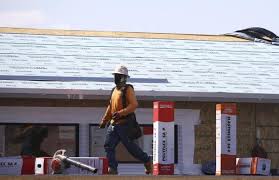
A recent report underscores the urgent need for faster permitting in Arizona's home construction process to address the state's ongoing housing affordability and supply challenges.
The Common Sense Institute (CSI) highlights that despite a slight decline in the overall housing shortage, Arizona's housing market continues to struggle with high prices, high interest rates, and a severe affordability crisis. According to Glenn Farley, CSI’s director of policy and research, “You have very high prices, very high interest rates, and it is the worst affordability crisis arguably in state history.”

The report reveals that the average home price in Arizona soared to $424,800 last year, up by $70,000 from pre-pandemic levels. Additionally, it now requires an annual income of $109,900 to purchase the average home in the state.
Farley suggests that the solution to Arizona's housing challenges lies in permitting more homes, especially those that are more affordable for first-time buyers. “The solution here is to permit more units, permit the kinds of units that can be more affordable to first-time buyers,” said Farley. “These are smaller units, multi-family units; smaller, single-family homes on smaller lots. These are the kinds of properties that we need to get approved for construction and then construct it if we want to bring prices down.”
CSI’s report estimates that Arizona is short approximately 57,000 housing units as of the fourth quarter of 2024. While this is an improvement from the 69,000-unit shortage the previous year, the current pace of permitting would take over 13 years to close the gap. In some areas, the situation is even worse. For instance, Maricopa County faces a housing deficit of around 37,000 units, and at the current permitting pace, it would take 150 years to address this shortage.
Farley explained that new construction, in a typical housing market, is generally more expensive than existing housing, similar to how new cars are typically priced higher than used cars. “New construction, in a normal, sort of healthy average housing market, is more expensive than existing housing, much like new cars are more expensive than used cars, but that sort of has inverted recently,” Farley said.
He continued, “New housing has actually in some markets been cheaper than existing housing. And it has certainly gotten cheaper than new housing was a few years ago, so what builders are basically trying to do is build more housing and build a different kind of product, a more affordable product to kind of backfill for that missing existing housing."

However, Farley noted that the problem lies in the slow pace of construction. “And the problem is they cannot do that fast enough or at high enough volume to really bring those prices down meaningfully or quickly,” he added.
Arizona’s housing market is facing a critical juncture, with affordability at an all-time low and the supply of homes struggling to keep up with demand. According to CSI, the bottleneck in permitting is a major factor hindering the construction of affordable housing options. Builders are increasingly focusing on constructing smaller, more affordable units, but slow permitting processes prevent them from meeting the rising demand in a timely manner.
The report stresses the importance of reforming the permitting process to allow for more efficient approval and construction of homes. Without such reforms, Arizona’s housing affordability crisis is expected to persist, exacerbating the challenges faced by first-time homebuyers and lower-income residents.
As the state continues to grapple with the impacts of rapid population growth and a tight housing market, the pressure is mounting on policymakers to find solutions that balance the need for new housing with the practicalities of construction and infrastructure development. Speeding up the permitting process could be one critical step toward alleviating Arizona’s housing shortage and addressing the affordability crisis.
Policymakers in Arizona are being urged to adopt faster permitting methods and streamline the approval process for new developments. While some municipalities are already exploring ways to expedite permitting, the report suggests that more needs to be done to encourage construction of affordable housing across the state.
One potential solution is the implementation of policy reforms that would make it easier for builders to obtain permits for smaller, more affordable homes or multi-family units. Additionally, improving coordination between local governments and developers could reduce delays and make it easier to bring new housing to market quickly.
The demand for affordable housing in Arizona is expected to continue growing, and without faster permitting, the state risks falling further behind in addressing its housing crisis. Taking action now could help create a more balanced and sustainable housing market, ensuring that future generations of Arizonans have access to affordable homes.
As Arizona navigates its housing challenges, it’s clear that more needs to be done to address the affordability and supply gaps. The call for faster permitting is just one piece of the puzzle, but it’s a crucial step toward ensuring that the state can meet the needs of its growing population while making housing more accessible to all. By accelerating the permitting process and building more affordable homes, Arizona could position itself to better handle future growth and improve housing outcomes for residents across the state.
Originally reported by Chris Woodward in The Center Square.